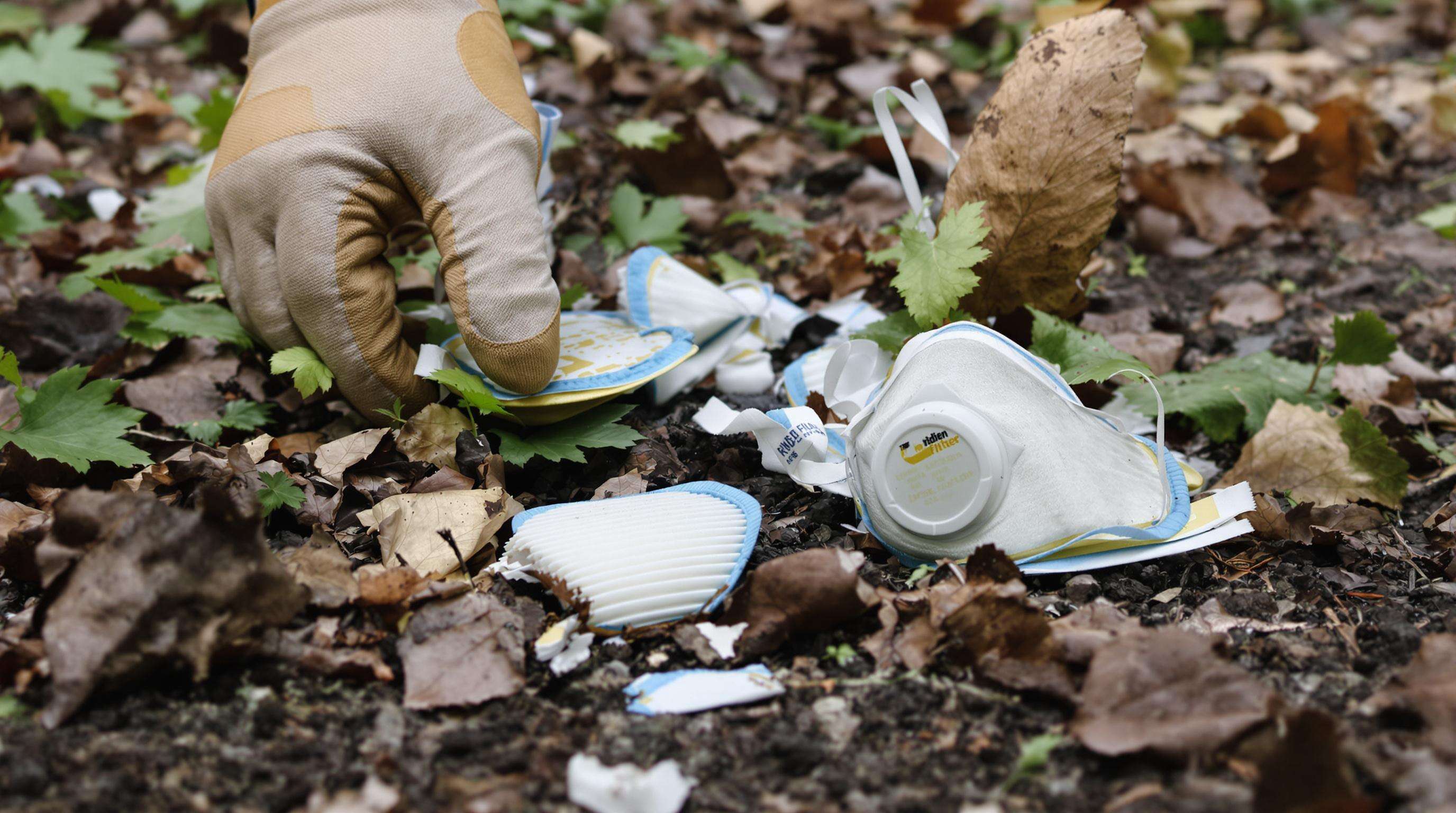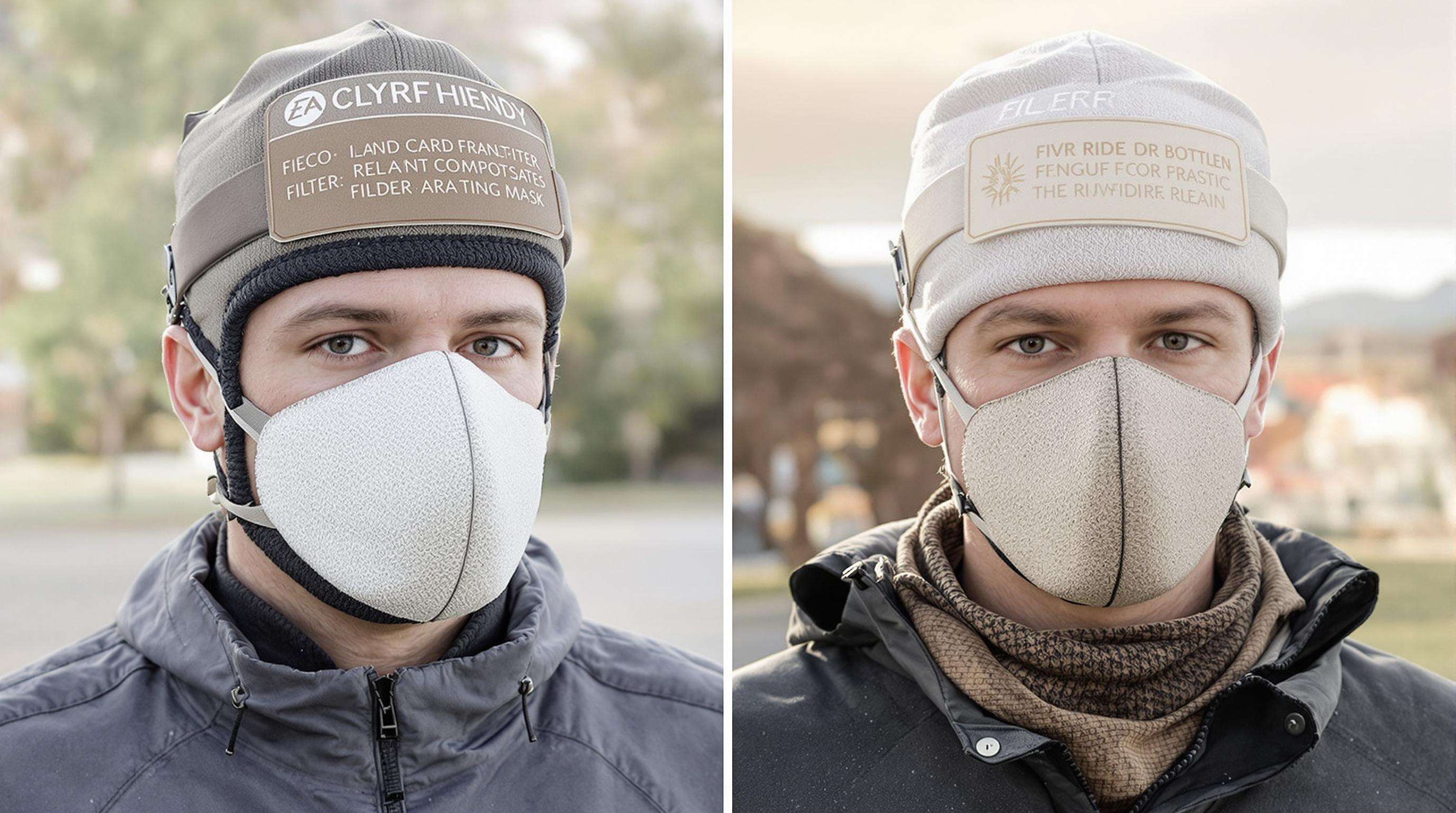מסננים לשימוש חוזר למסיכות נשימה עבור מפעילי סיורים בעלי תודעה סביבתית
הבעיה הסביבתית עם מסכות רכיבה מסורתיות

מסנניםmgr ותרומתם לזיהום בדרכי הטבע
מסכות רכיבה שמסנן אותן החומר אינו מפורק מופיעות בכל רחבי האזורים הטבעיים שלנו. מחקר חדש גילה כי כמעט שליש מהמרכבים פשוט זורקים את המסננים הישנים שלהם על שביל כשסיימו (Sustain Environ Res 2023). מה קורה אחר כך? החלקים החד-פעמיים הופכים לחתיכות פלסטיק זעירות שנשארות בקרקע ובמערכות המים למשך שבע עד עשרים ושמונה שנה. צוותי תחזוקה שעובדים על שבילים פופולריים שמו לב לדבר מטריד נוסף. הם אומרים שמסננים חד-פעמיים מהווים כמעט שני שלישים מהזבל מיקרופלסטי שהם מוצאים. הסחרחורת הזו גרועה מספיק כדי להיות נראית בעין בלתי מזוינת, וזה פשוט לא מתיישב עם הדרך בה רוב העסקים הקשורים בא웃דור רוצים להציג את עצמם כחברים לסביבה בימינו.
השוואת פußע פחמן: מערכות מסכת רכיבה חד-פעמיות לעומת מערכות ניתנות לשימוש חוזר
ההשפעה הסביבתית שלמערכות חד-פעמיות היא משמעותית למדי, ובעצם יוצרת פי שלושה את כמות פליטת הפחמן הדו-חמצני לאדם בכל שנה בהשוואה לאפשרויות הניתנות לשימוש חוזר. הדבר נובע בעיקר מההתבססות הכבדה על דלקים מאובנים ביצור המוצרים הללו, וכן מהשגרה של זריקתם לאחר שימוש בודד. נבחן זאת בהקשר. לייצור של 100 מסננים חד-פעמיים נדרשים כ-18 ליטר נפט גלם, בעוד שמסנן שניתן לשימוש חוזר ומיוצר באיכות גבוהה זקוק ל-2 ליטר בלבד עבור כל מחזור החיים שלו, גם לאחר ניקוי ב-200 פעמים. וגם ההובלה היא חלק מהמשוואה. הדרישה המתמדת להשלמת מלאי של מוצרים חד-פעמיים מוצרים פירושה של חמישה מסירות במהלך העונה, מה שמעמיס במהירות על הסביבה בשל הפליטות הנוספות מכל אותם מסעות נוספים הלוך ושוב.
איך רכיבי מסכות רכיבה חד-פעמיים פוגעים במטרות התיירות הקיימות
לפי סטנדרטים העדכניים ביותר מ-2024 בתחום התיירות האקולוגית, כל מפעיל שirá לזכות באישור תיירות ירוקה יאבד כ-22% מהנקודות שלו אם יסתמך על ציוד חד-פעמי. רוב חברות התיירות האדיבניות (בערך 8 מתוך 10) הבטיחו להגן על הסביבה, אך התייחסותן למסננים חד-פעמיים סותרת לחלוטין את ההתחייבות הזו, וייתכן שתפגע בביטחון הלקוחות. חישבו על מה שקורה במהלך שבוע טיפוסי: רק קבוצה אחת של 50 אנשים יוצרת כ-5 קילו פסולת מסננים שאינה ניתנת لإعادة מחזור. זה מצטבר לכדי חצי טון פסולת פלסטיק במשך שנה שלמה, מה שמפריך את מטרות הפסולת האפסית שחברות רבות טוענות לתמוך בהן בימינו.
יתרונות מסנני פנים לשימוש חוזר עבור מנהלי תיירות
הפחתת ההשפעה הסביבתית באמצעות שילוב ציוד נייד ובר קיימא
מסכות רכיבה עם מסננים לשימוש חוזר מצמצמות את הפסולת הפלסטיקית החד-פעמי שמסתיימת מזוהמת שבילים בכל מקום. על פי דוח עדכני של האגודה לתעשייה החופפית מ-2023, חברות שממשיכות להשתמש במסננים חד-פעמיים יוצרות כ־2.3 טון של פסולת מסכות בכל שנה, לכל אלף אנשים שמשמשות. כשסוכני טיולים עוברים למערכות אלו לשימוש חוזר, ש chếבות מחומרים מחזוריים, הם לא רק שולחים פחות פסולת לפארים, אלא גם שומרים על רמת האיכות של האוויר בטווח הרצוי. אנחנו רואים את השינוי הזה קורה במקביל לעלייה בפופולריות של ציוד נסיעות בר קיימא ברחבי צפון אמריקה. השוק לمنتجات ירוקות אלו צפוי לגדול בכ־17% מדי שנה, כאשר יותר אנשים תובעים הסביבה מחפשים דרכים להינות מהטבע מבלי להשאיר אחריהם נזק כה גדול.
חסכון ארוך טווח בעלות כתוצאה מהמעבר למערכות מסכות רכיבה לשימוש חוזר
למרות שמסננים לשימוש חוזר דורשים השקעה ראשונית גבוהה ב-35%, מפעילים חוסכים 18–22 דולר לאדם בשנה לעומת החלפות חד-פעמיות. פעולה של 50 לקוחות ביום משלמת את ההשקעה תוך 14 חודשים דרך הנחות בקניות ובש disposing of פסולת. עיצובים עמידים עם דירוג של 300 מחצלות ומעלה מאריכים את חוסך הכסף, בעוד חדשנות כמו ריפוד אנטי-מיקרוביאלי מקטינה את הצורך בהחלפות ב-60%
מקרה לדוגמה: חברת Alpine Trek קיצצה בפסולת ב-40% באמצעות מסננים לשימוש חוזר
לאחר שהחליפה על מסננים לשימוש חוזר ב-2022, החברה הזו מקולורדו סילקה 8,200 מסננים חד-פעמיים בשנה ב-12 המסלולים שלה. ההשקעה המקורית של 9,200 דולר הניבה חיסכון שנתי של 14,500 דולר בקניות ובManagement פסולת. דירוגי שביעות רצון של הלקוחות עלתה ב-22% עקב נוחות מוגדלת ומאמצנים נראים בתחום הקיימות
הגברת נאמנות ופניות חוזרות של לקוחות באמצעות מוצרים ניידים ידידים לסביבה
לפי נתונים עדכניים מאיגוד המסחר בשטייטל אד벤처, כ-73 אחוז מהמטיילים באד벤처 מתחילים לחפש חברות המשתמשות בציוד בר קיימא. מערכות המסכות לשימוש חוזר הפכו למשהו בולט לרבים מהמטיילים. חברת אלפין טרק גילתה שכמעט שני שלישים (בערך 68%) מהלקוחות החוזרים מזכירים את המסכות החברתיות כ motivo העיקרי לחזור מידי שנה. כאשר מפעילי הפעילות מדגישים את הציוד לשימוש חוזר בפרסומי התוכן שלהם, הם למעשה צופים בגידול של כ-31% בהמלצות. זה הגיוני, אנשים רוצים לתמוך בעסקים המשקפים את ערכיהם.
חומרים חדשניים וביצועים של מסכות רכיבה ידידותיות לסביבה

מסכות מיוצרות מבקבוקי פלסטיק מחזירים: קיימא ומשפיעות על הסביבה
מסכות מודרניות לרכב משתמשות لدוח הפלסטיק (PET) מהצרכן שופך פלסטיק מזוהם מאזור האוקיינוס למנייה של סיבי טקסטיל בעלי ביצועים גבוהים. מסננים אלו עמידים לשימוש של 200+ שעות בסביבות מסוערות – תואם למסננים מייצור פלסטיק חדש. סקירת חומרים ברורים ב-2024 מציגה ירידה של 89% בפליטת פחמן בעת ייצור מסננים מ-PET מחזורית לעומת חלופות ניילון מסורתיות.
נשימתיות ויעילות סינון בעיצובים ברורים
تقنيות אריגה מתקדמות מאפשרות זרימת אויר עדינה ב-34% טובה יותר ב масכות ידידותיות לסביבה בהשוואה לחד-פעמיים, מבלי לפגוע בביטחון. מבנים מרובי שכבות שילובו פוליאסטר מחזורי עם קרומים צמחיים חוסמים חלקיקים בגודל 0.3 מיקרון – קריטי לסביבות אפרתיות וטיולי אופניים עירוניים.
| סוג חומר | זרימת אויר (CFM) | יעילות סינון |
|---|---|---|
| חד-פעמי מסורתי | 28 | 95% |
| PET מחומש | 38 | 98.7% |
| קומפוזיט צמחי | 41 | 99.1% |
תוצאות בדיקה של צד ג': 99.2% איסוף חלקיקים
מעבדות עצמאיות מאששות שמערכות הניתנות לשימוש חוזר עונות להגנה דרגת N95, עם תוצאות בדיקה של מכון הבטחה אלפיני שמראה יעילות סינון של 99.2% ב-150 מחזורים של שימוש. ביצועים מותאמים אלו מפריכים דאגות בנוגע לירידה בביצועים בחלופות בר קיימא.
איך חדשנות בחומרים תומכת בשתי מטרות
שבילות across-industry מאפשרות כיום אופטימיזציה בו-זמנית של ביצועים סביבתיים ופונקציונליים. קרשים בעלי שינוי פאזה שפותחו לסוללות רכב חשמלי מאפשרים תкладים לספogie נועלים לשלוף רטיבות, בעוד פלסטיק מחזורני עם גרפן מספק תכונות אנטי-מיקרוביאליות ללא ציפויים כימיים – אידיאלי להפעלה חוזרת של סיורים.
יישום מסננים לשימוש חוזר בכפפות נשימה בתפעול סיורים
ההעברה למערכות כפפות נשימה לשימוש חוזר מחייבת תכנון אסטרטגי לאורך ארבעה עמודי תפעול: שדרוג ציוד, תהליכי תחזוקה, הדרכת צוות, ומסגרות להרחבת קנה מידה.
מדריך צעד אחר צעד למעבר מק Disposable לכפפות נשימה לשימוש חוזר
התחל עם יישום בשיפועים:
- בצע תוכנית טיסה של 30 יום עם 10% מהמלאי כדי להעריך לוגיסטיקה של ניקוי
- להתקין תחנות תחזוקה במיכלי ניקוי אולטרא-סוני ובסבונים מתפרקים ביולוגית
- לקבוע מערכת סיבוב מסננים המבטיחה זמני ייבוש של 48 שעות בין שימושים
פרוטוקולי תחזוקה לאיתור היגיינה, ביטחון ואורך חיים של מסננים
מחקר משנת 2021 על סינון אירוזולים ( אيرוזולים ות quality האויר ) הראה שמסננים על בסיס פשתן שומרים על יעילות של 99% לאורך 50 מחזורי כביסה או יותר, כאשר הם ננקים במים קרים וייבשים באוויר. ליישום תגיות זיהוי בצבעים לפקוח על:
- מספר כביסות (להחלפה לאחר 75 מחזורים)
- רמות של ניסוית חלקיקים (להחלפה לאחר הצטברות של 0.5 מ"מ)
הכשרת צוות והדרכה לנוסעים על ציוד נסיעות בר-קיימא שמיוצר מחלפים מות recycled
לפתח מדריכים קצרים רב-שוניים המציגים:
- טכניית הרכבה/הסרה נכונה של מסכה
- מצייני תחזוקה ויזואליים
- מדדי השפעה סביבתית לכל סיור
להכניס demonstrations לטיפוח מסננים בהסברים על ביטחון לפני הרכיבה תוך השוואת מסנן שטוח למסנן חדש.
הרחבת אימוץֿ across צוותי רכב ומבצעי עונה
התחל עם קווים עונתיים בדרישה גבוהה בקיץ לפני הרחבה ל-:
- תוכניות ספורט חורפי (התאם זמני יבוש לרמה גבוהה של לחות)
- משלמות ימיות (להקים תחנות ניידות לטיפול/ניקוי)
- תכניות שותפויות קורפורטיביות (להציע מסננים עם לוגו כמתנה ללקוחות)
מפעילי תיירות המיישמים פרוטוקולים אלה מדווחים על מחזורי החלפת מסכות מהירים יותר ב-63% ועל ציוני שביעות רצון גבוהים יותר של לקוחות ב-22% בנוגע לנוחות ולנהלים סביבתיים.
העתיד של ציוד נסיעות בר-קיימא בתעשייה התיירותית
איך מוצרים ניידים ידידותיים לסביבה משנים את דרכי הציפיות של הלקוחות
יותר ויותר מטיילים הרפתקנים מחפשים כיום חברות שממש מקבלות ברצינות את הנושאים האקולוגיים. כשלושה רבעים מהדור המילני בודקים אם יש לחברה את התעודות הנדרשות חברה בעלי אישורי קיימות מתאימים לפני הזמנת הטיול שלהם. השוק השתנה כל כך עד שמסננים רב פעמיים למסכות רכיבה הפכו לסטנדרט בקרב הרפתקנים בעלי מודעות אקולוגית, ודוחקים הצידה את האפשרויות החד-פעמיות שלא תאמו את מה שחברות התיירות טענו לגבי היותן ירוקות. חברות הנמצאות בחזית המגמה הזו שמות לב למשהו מעניין גם כן - הלקוחות שלהן שמביאים איתן ציוד בר-קיימא נוטים לתת להם דירוגי משוב טובים יותר בכ-22%. בימינו, אנשים רוצים שהציוד שלהם יתפקד היטב ובמקביל יעשה טוב לכדור הארץ, ולשני הגורמים יש משקל שווה כאשר מישהו מחליט היכן להוציא את כספי החופשה שהרוויח בעמל רב.
נתונים: 68% מהמטיילים באventura מעדיפים אופרטורים המשתמשים בציוד נסיעות בר קיימא, שמיוצר מחומרים מות recycled
לפי מחואות שוק עדכניות, כשלושה רבעים מהאנשים השותרים בקביעות מחפשים חברות סיור המשתמשות בציוד שמיוצר מחומרים מות recycled. כשליש מהם טוענים שהם מוכנים לשלם יותר אם החברה תוכל להוכיח שהמוצרים שלה הם באמת ידידותיים לסביבה. זה תואם את מה שאנחנו רואים בתעשייה כולה בימים אלו. חברות עם אישורי איכות סביבתיים תקניים צוברות תנופה, וצוברות כ-19 נקודות אחוז נוספות של שוק מאז תחילת 2021. לדוגמה, מסכות רכיבה לשימוש חוזר הן דוגמה טובה לשינויים שקורים. מסכות אלו עולות מפלסטיק של מוצרים צרכניים ישנים עם מסננים שמתאימים לסטנדרטים של HEPA, כך שעובדות הן גם להגנת הסביבה וגם לשמירה על הבטחה של המשתמשים במהלך טיולים בחוץ.
שאלות נפוצות
למה מסכת רכיבה חד-פעמית נחשבת למזיק לסביבה?
מסיכי רכיבה חד-פעמיים תורמים לזיהום הסביבה עקב החומרים שאינם מתפרקים ביולוגית, מה שמוביל לפסולת מיקרופלסטיק ממושכת בטבע ולפליטת פחמן גבוהה יותר עקב הייצור והחלפות התכופות.
מהן ההטבות של שימוש במסננים לשימוש חוזר למסיכי רכיבה?
מסננים לשימוש חוזר מפחיתים משמעותית את פסולת הפלסטיק, מקטינים פליטת פחמן, מציעים חיסכון כלכלי לאורך זמן ותומכים במטרות התיירות הקיימות על ידי התאמה לחוות אקולוגיות.
מהו ההשפעה ה_financial על חברות תיירות כתוצאה משימוש במסיכי רכיבה לשימוש חוזר?
למרות שההשקעה ההתחלתית במסננים לשימוש חוזר היא גבוהה יותר, החברות חוסכות בעלויות אספקה וניהול פסולת לאורך זמן, ורואות תשואה על ההשקעה לאחר כ-14 חודשים.
אילו חומרים משמשים למסננים ידידותיים לסביבה למסיכי רכיבה?
המסננים הללו משתמשים בחומרים מוחזרים כמו פלסטיק PET לצורך קיימום, נשימה מותאמת ויעילות סינון גבוהה יותר בהשוואה למסיכי רגיל.
איך יכולים מפעילי סיורים לעבור לשימוש במסיכים לשימוש חוזר?
מפעילים יכולים להתחיל השקה בשלבים, לאמן עובדים, לקבוע פרוטוקולים חדשים לתפעול שוטף, וללמד נוסעים על היתרונות והטיפול בפילטרים לשימוש חוזר

